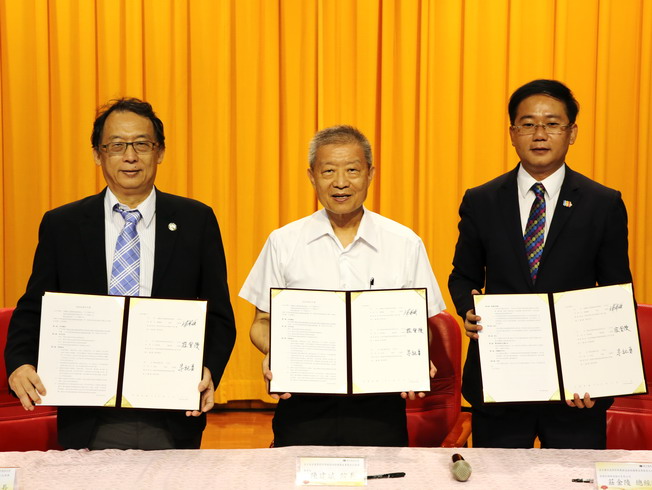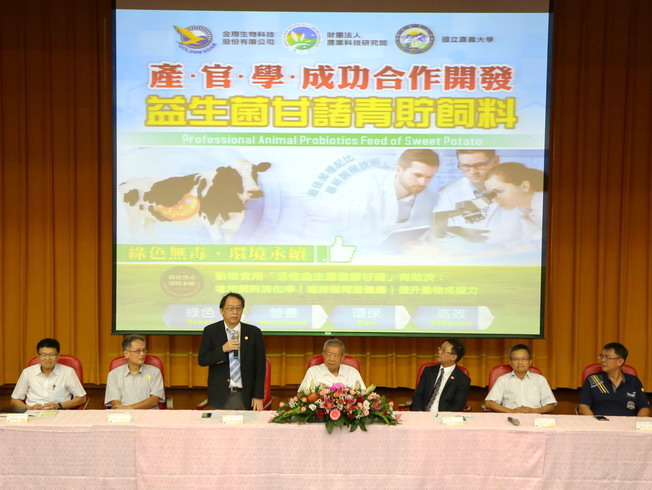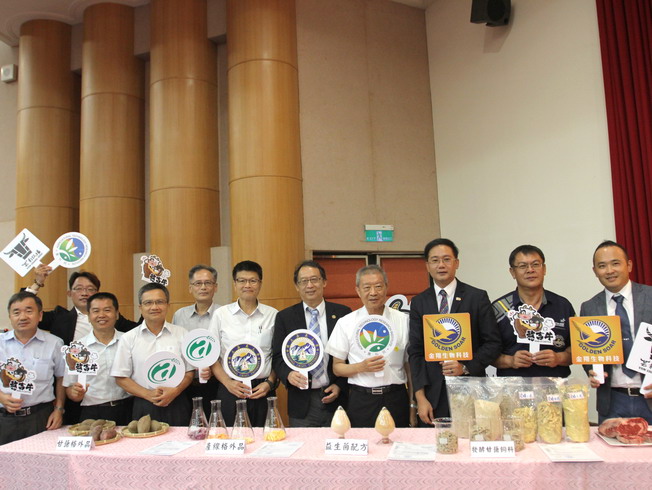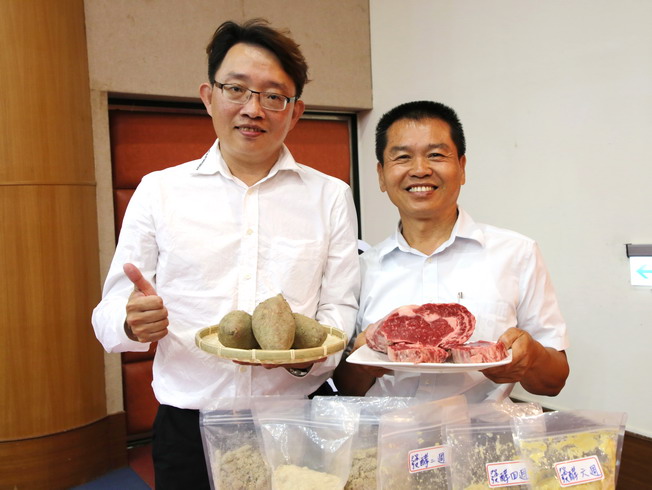 National Chiayi University, Agricultural Technology Research Institute (ATRI) and Golden Soar Biotech Co., Ltd. jointly organized “Probiotic Sweet Potato Silage Process Technology Authorization Ceremony and Presentation” at the International Conference Hall on the Lantan campus on July 13th. The grand event was attended by guests of honor including Zhang Xiao-Ren, Senior Engineer of the Council of Agriculture (COA), Chiu Yu-Hsiang, General Manager of K.K. Orchard, and Su Nian-Cheng, Chairman of Taiwan Beef Industry Progress Association. On the behalf of their respective organizations, NCYU Vice President Chu Chi-Shih and ATRI President Jen-Pin Chen signed an agreement to authorize Golden Soar Biotech Co., Ltd. to utilize the process technology of probiotic sweet potato silage. In the future, they will join efforts to effectively enhance the commodity value of out-of-specification potatoes, and achieve the economic goals of agricultural recycling. The collaboration is expected to help significantly reduce dairy production costs and enhance industrial competitiveness, and substantially facilitate cooperation among local agricultural and animal husbandry industries.
National Chiayi University, Agricultural Technology Research Institute (ATRI) and Golden Soar Biotech Co., Ltd. jointly organized “Probiotic Sweet Potato Silage Process Technology Authorization Ceremony and Presentation” at the International Conference Hall on the Lantan campus on July 13th. The grand event was attended by guests of honor including Zhang Xiao-Ren, Senior Engineer of the Council of Agriculture (COA), Chiu Yu-Hsiang, General Manager of K.K. Orchard, and Su Nian-Cheng, Chairman of Taiwan Beef Industry Progress Association. On the behalf of their respective organizations, NCYU Vice President Chu Chi-Shih and ATRI President Jen-Pin Chen signed an agreement to authorize Golden Soar Biotech Co., Ltd. to utilize the process technology of probiotic sweet potato silage. In the future, they will join efforts to effectively enhance the commodity value of out-of-specification potatoes, and achieve the economic goals of agricultural recycling. The collaboration is expected to help significantly reduce dairy production costs and enhance industrial competitiveness, and substantially facilitate cooperation among local agricultural and animal husbandry industries.
Due to limited land resources in Taiwan, the industries have been depending on foreign imports for all feed grains, with the self-sufficiency rate of pasture grass amounting to less than 56% in recent decades. Each year, around 250,000 metric tons of hay, worth about NT$1 billion, need to be imported. The project, which received grants from the COA in 2020, aims to enhance the synergy between the academic research organizations including NCYU Department of Animal Science and the ATRI. After nearly two years, they have successfully developed the process technology of “probiotic sweet potato silage,” which is later produced by Golden Soar Biotech Co., Ltd. Through matchmaking in the domestic beef cattle industry, Yun Chang Beef, Fengcheng Livestock Farm and Yunniu Livestock Farm have been testing by feeding the “Hanji cattle” with the probiotic sweet potato silage, partly made from Taiwan-grown sweet potatoes, or Hanji in Taiwanese.
According to animal test results by the ATRI, the domestic male Holstein steers fed with the probiotic sweet potato silage grow better than those fed with feed corn. The resulting beef products reach Choice marbling score or above, with some even reaching Prime. Chean-Ping Wu, Associate Professor of the NCYU Department of Animal Science, indicated that if feeding ordinary raw sweet potatoes causes bloating in the cattle, it is suggested to replace them with the probiotic sweet potato silage, which can effectively help relieve the bloating. Production of the silage can replace 20% of domestic corn feeds, and reduce the dependence of the domestic animal husbandry on imported corn. It is expected to extend to pig feeds in the future, thus improving the economic cycle in the agricultural sector.
Dr. Zhuang Ling-Jin, General Manager of Golden Soar Biotech, mentioned that high-end animal nutritional feeds can be made from out-of-specification potatoes with the probiotic fermentation technology in the days to come. By doing so, they can help maintain the commodity value of sweet potatoes, realize the goal of circular economy in the agricultural sector, and above all contribute to the development of domestic agricultural products and local industries. In the future, they will invite K.K. Orchard and other local agricultural companies to make good use and increase the added value of high-quality, out-of-specification sweet potatoes. It is also hoped to help increase the income of all the hardworking farmers.
   |